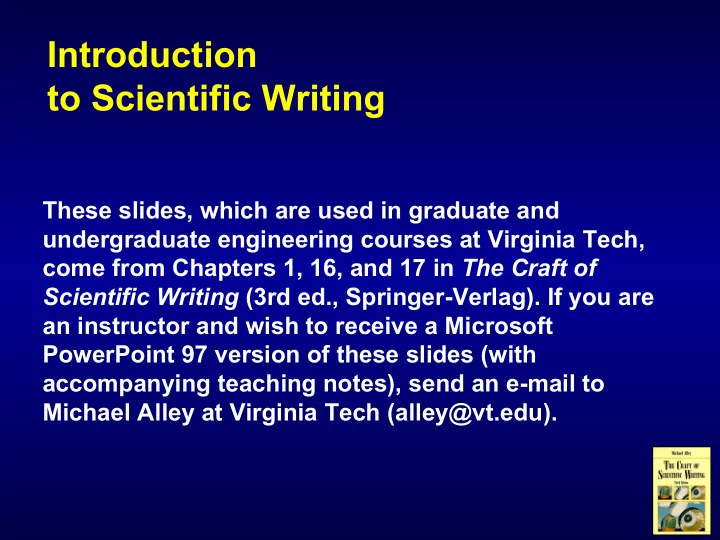

Introduction to Scientific Writing These slides, which are used in graduate and undergraduate engineering courses at Virginia Tech, come from Chapters 1, 16, and 17 in The Craft of Scientific Writing (3rd ed., Springer-Verlag). If you are an instructor and wish to receive a Microsoft PowerPoint 97 version of these slides (with accompanying teaching notes), send an e-mail to Michael Alley at Virginia Tech (alley@vt.edu).
Scientific Writing: An Introduction Writing Guidelines for Students The Craft of Scientific Writing http://www.me.vt.edu/writing/ 3rd edition (Springer-Verlag, 1996)
This presentation discusses the importance of scientific writing and introduces key principles Importance of Key Principles Scientific Writing audience occasion purpose
How well you communicate affects your career Survey (Richard M. Davis) Successful engineers spent 25% of work week writing Survey (Wisconsin) Professional engineers found writing their most useful subject Survey (Virginia Tech) Recruiters claim that engineers need more work on their writing
How well you communicate affects the well-being of others Explosion was caused by failure of O- rings in the solid rocket boosters Engineers knew of O-ring problems well before fatal launch Engineers failed to communicate seriousness of problem Space Shuttle Challenger (January 28, 1986)
Scientists and engineers are called upon to communicate in many different situations Conferences Reports Lectures Articles Meetings Proposals Posters Web Pages specific general non-technical technical technical audiences audiences audiences
This presentation discusses the importance of scientific writing and introduces key principles Importance of Key Principles Scientific Writing audience occasion purpose
Scientific writing differs from other kinds of writing Subject Matter Writing Constraints audience occasion purpose Purpose of Writing Writing Style To inform To persuade
You should begin the writing process by analyzing your constraints Who they are Audience What they know Why they will read How they will read Format Formality Occasion Politics and ethics Process and deadline To inform Purpose To persuade
Three aspects of writing affect the way that readers assess your documents Content Style Form
Style is the way you communicate the content to the audience words Illustration wordswords wordswordswords wordswordswordswords wordswordswords wordswordswords wordswordswords wordswordswords Structure Language style
Form embodies the format and mechanics of the writing mechanics format grammar typography usage layout punctuation spelling
We can split the writing process into stages Writing the First Draft Getting in the Mood Writing the First Draft Getting in the Mood Finishing Revising, Revising, Revising Finishing Revising, Revising, Revising
An excellent way to improve your writing is to choose good models AIP Cal-Tech Linus Pauling Maria Goeppert Mayer
Recommend
More recommend